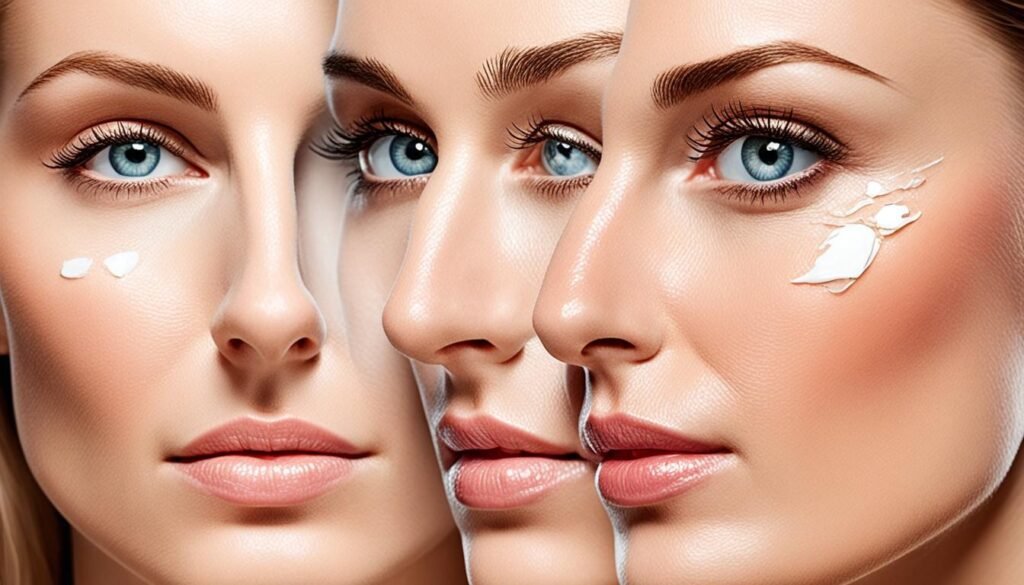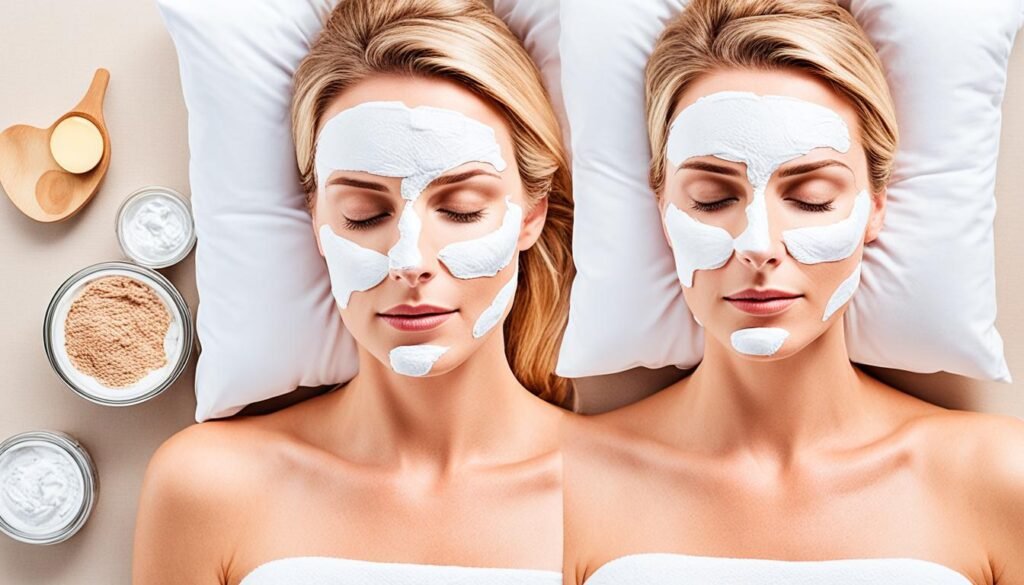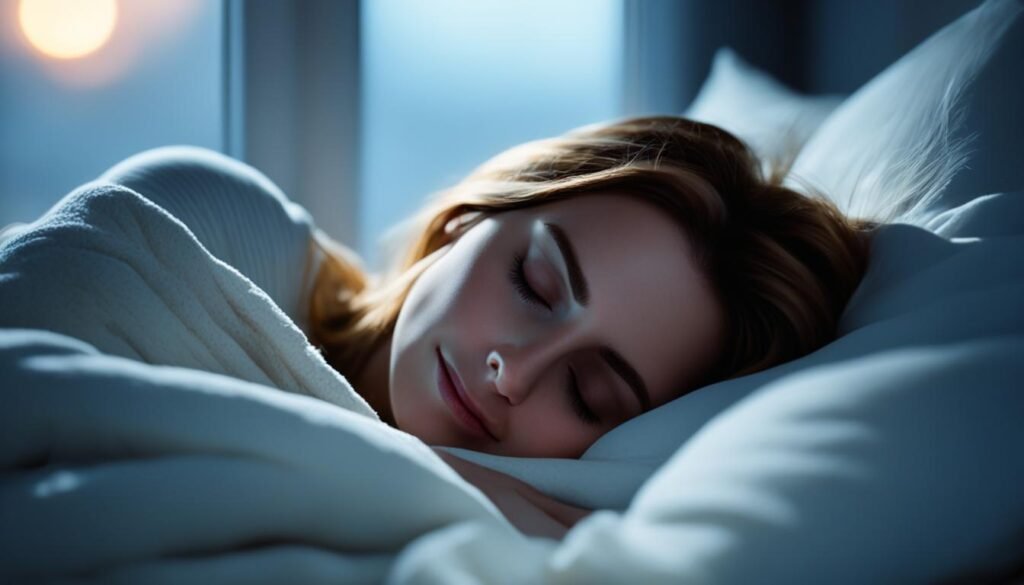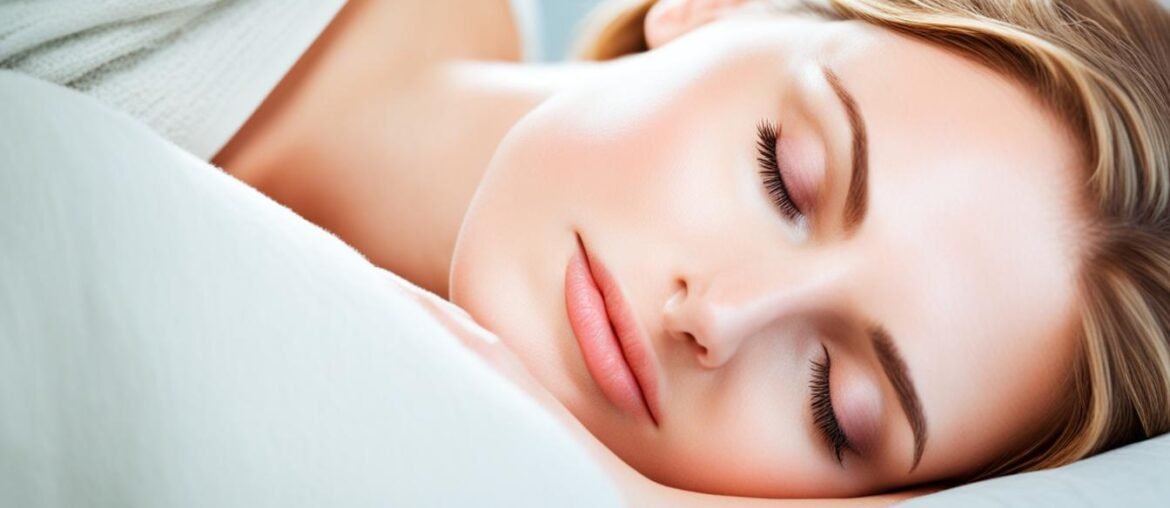Did you know that sleep quality has a direct impact on the health and aging of your skin?
Studies have shown that chronic poor sleep quality can have negative effects on skin function and appearance. Lack of sleep can lead to increased signs of aging, diminished skin barrier function, and lower satisfaction with appearance. In other words, not getting enough quality sleep can make your skin age faster and look less youthful.
But why is sleep so important for your skin? And what can you do to ensure you’re getting the quality rest your skin deserves? Let’s dive deeper into the fascinating connection between sleep and skin health.
Key Takeaways:
- Poor sleep quality can negatively impact skin function and appearance.
- Lack of sleep can lead to increased signs of aging and diminished skin barrier function.
- Adequate sleep is crucial for maintaining a healthy complexion and promoting skin rejuvenation.
- Improving sleep quality can have significant benefits for skin health and appearance.
- Implementing good sleep habits, such as sticking to a consistent sleep schedule, practicing good sleep hygiene, and creating a quality sleep environment, can help optimize sleep for better skin.
Importance of Sleep for Skin Rejuvenation
Sleep plays a crucial role in maintaining the health and vitality of our skin. It is during sleep that the body engages in essential processes for skin rejuvenation, including the production of collagen. Collagen is a protein that provides structural support to the skin, giving it its elasticity and reducing the appearance of wrinkles.
When we sleep, our bodies naturally increase collagen production, allowing the skin to repair and regenerate itself. This helps to maintain a youthful and radiant complexion. Adequate sleep also promotes a healthy skin barrier, protecting it from external aggressors and preventing moisture loss.
However, the lack of sufficient sleep can disrupt collagen production, leading to premature aging of the skin. It can also impair the skin’s ability to repair and regenerate, resulting in a dull and lackluster complexion. Additionally, inadequate sleep can cause increased inflammation in the body, which can contribute to the development of various skin issues.
Getting enough quality sleep is crucial for the overall health and appearance of our skin. It allows for optimal collagen production, skin rejuvenation, and the prevention of premature aging.
An integral part of a skincare routine should be prioritizing sleep and ensuring that we get enough rest each night. This means practicing good sleep habits, such as establishing a consistent sleep schedule, creating a comfortable sleep environment, and adopting relaxation techniques before bed.
By recognizing the importance of sleep for skin rejuvenation, we can take proactive steps towards achieving and maintaining youthful, glowing skin.
Benefits of Sleep for Youthful Skin:
- Promotes collagen production
- Supports skin repair and regeneration
- Maintains a healthy skin barrier
- Reduces the appearance of wrinkles
- Enhances skin’s radiance and glow
| Effects of Sleep on Skin Rejuvenation | Effects of Lack of Sleep on Skin Aging |
|---|---|
| Increased collagen production | Disrupted collagen production |
| Improved skin repair and regeneration | Impaired skin repair and regeneration |
| Enhanced skin elasticity | Premature aging of the skin |
| Reduced appearance of wrinkles | Increased signs of aging |
Effects of Lack of Sleep on Skin Aging

A good night’s sleep is essential for maintaining healthy and youthful-looking skin. Lack of sleep can have detrimental effects on the aging process of the skin, leading to visible signs of aging such as wrinkles, fine lines, and sagging skin. Adequate sleep plays a vital role in maintaining a healthy complexion as it allows the skin to regenerate and repair itself.
When we sleep, our body undergoes a natural rejuvenation process, which includes the production of collagen and the renewal of skin cells. Collagen is a protein responsible for maintaining the skin’s elasticity and firmness, helping to reduce the appearance of wrinkles. Sleep deprivation disrupts this collagen production process, leading to premature aging of the skin.
Furthermore, inadequate sleep can impair the skin’s natural regeneration process, causing the skin to appear dull and aged. During sleep, the body repairs and replenishes damaged skin cells, helping to maintain a vibrant and youthful complexion. Without enough sleep, this crucial regeneration process is disrupted, resulting in a tired and lackluster appearance.
To maintain a healthy complexion and slow down the aging process, it is essential to prioritize quality sleep. By ensuring you get enough restful sleep each night, you can promote the natural regeneration of your skin and keep it looking young and vibrant.
The Link between Sleep and Skin Health
Research has shown that there is a strong correlation between sleep quality and skin health. Poor sleep quality can accelerate the aging process, leading to the formation of wrinkles and other visible signs of aging. On the other hand, prioritizing sleep and improving sleep quality can have significant benefits for skin rejuvenation and a healthy complexion.
Investing in a good sleep routine, creating a comfortable sleep environment, and practicing good sleep hygiene are essential steps in ensuring quality sleep. By giving your body the rest it needs, you can support the natural regeneration and repair processes of your skin, leading to a more youthful and radiant appearance.
| Effects of Lack of Sleep on Skin Aging | Benefits of Sleep for a Healthy Complexion | Sleep and Skin Regeneration |
|---|---|---|
| Increased signs of aging, such as wrinkles, fine lines, and sagging skin | Promotes the natural regeneration of skin cells | Supports the body’s repair processes for damaged skin cells |
| Disruption of collagen production, leading to premature aging | Helps maintain the skin’s elasticity and firmness | Aids in reducing the appearance of wrinkles |
| Dull and aged appearance due to impaired skin regeneration | Improves the skin’s texture and tone | Enhances the overall appearance of the complexion |
By understanding the effects of lack of sleep on skin aging, we can take proactive steps to prioritize quality sleep and promote a healthy complexion. Incorporating good sleep habits into our daily routines can have a profound impact on the health and appearance of our skin, allowing us to maintain a youthful and radiant glow.
Sleep and Skin Barrier Function
Sleep plays a vital role in maintaining the skin’s barrier function. When we don’t get enough sleep, it can weaken the skin’s protective barrier, making it more susceptible to damage from external factors. This can lead to increased wrinkle formation and other skin issues.
During sleep, our skin undergoes a crucial regeneration process. This process helps restore and strengthen the skin’s protective barrier, which is essential for maintaining a healthy complexion. Sufficient sleep is necessary for allowing the skin to repair itself and prevent skin issues.
Adequate sleep promotes healthy skin by:
- Enhancing skin’s natural regeneration
- Supporting collagen production
- Preserving the skin barrier
- Minimizing wrinkle formation
“Sleep is not just a luxury; it is essential for maintaining the integrity of our skin. Lack of sleep can compromise the skin’s barrier function, leading to increased vulnerability to environmental stressors and wrinkle formation.”
To emphasize the importance of sleep for maintaining skin barrier function, it’s crucial to adopt healthy sleep habits. This includes maintaining a consistent sleep schedule, practicing good sleep hygiene, and creating a sleep environment conducive to restful sleep. Prioritizing sleep not only improves overall well-being but also contributes to a healthy and youthful-looking complexion.
| Sleep and Skin Barrier Function | |
|---|---|
| Impact of sleep on skin barrier | Sleep helps restore and strengthen the skin’s protective barrier, preventing damage and promoting a healthy complexion. |
| Effects of lack of sleep | A lack of sleep weakens the skin barrier, making it more susceptible to damage and leading to increased wrinkle formation. |
| Importance of adequate sleep | Adequate sleep is crucial for maintaining skin health, preventing skin issues, and minimizing wrinkle formation. |
Sleep Quality and Skin Health

The quality of sleep has a direct impact on overall skin health. Poor sleep quality can lead to an array of skin issues, including the formation of wrinkles. Adequate sleep is essential for maintaining youthful-looking skin as it allows the skin to repair and regenerate itself. Let me explain why sleep quality is crucial for optimal skin health and appearance.
The Benefits of Sleep for Youthful Skin
A good night’s sleep is like a fountain of youth for your skin. During sleep, the body produces more collagen, a protein that gives skin its elasticity and reduces the appearance of wrinkles. Collagen production is crucial for maintaining a smooth and youthful complexion. Lack of sleep can disrupt collagen production, leading to premature aging and the formation of wrinkles.
“Adequate sleep allows the skin to repair and regenerate itself, promoting a healthy and youthful complexion.”
In addition to collagen production, sleep also plays a vital role in skin cell turnover. While you sleep, the skin undergoes a regeneration process, replacing old, damaged cells with fresh new ones. This process helps to improve skin texture and tone, giving you a healthy and glowing complexion.
Sleep and Wrinkle Formation
One of the most significant benefits of quality sleep is its effect on wrinkle formation. Lack of sleep can lead to increased stress levels, which consequently elevates the production of stress hormones, such as cortisol. Elevated cortisol levels can break down collagen, causing the skin to lose its elasticity and leading to the formation of wrinkles.
Furthermore, inadequate sleep impairs the skin’s ability to retain moisture, resulting in dryness and a dull complexion. When the skin is dehydrated, fine lines and wrinkles become more pronounced, emphasizing the signs of aging.
Improving Sleep for Gorgeous Skin
To enhance sleep quality and promote healthy skin, it’s crucial to establish a consistent sleep schedule. Going to bed and waking up at the same time each day helps regulate the body’s internal clock, promoting a more restful sleep.
Creating a relaxing bedtime routine can also have a significant impact. Engaging in activities such as reading a book, taking a warm bath, or practicing relaxation exercises can help signal to your body that it’s time to wind down and prepare for sleep.
In addition, optimizing your sleep environment can contribute to better sleep quality. Make sure your bedroom is cool, dark, and free from distractions. Invest in a comfortable mattress and pillows to enhance your sleeping experience.
Sleep and Dark Under-Eye Circles
Lack of sleep can have visible effects on the appearance of dark under-eye circles. When we don’t get enough sleep, it can lead to increased blood flow and dilation of blood vessels around the eyes. This can result in the darkening of the under-eye area, making the circles more noticeable.
Adequate sleep is essential for reducing the appearance of dark circles and promoting a healthy complexion. Getting enough sleep helps improve blood circulation, which can reduce the visibility of dark circles and promote a more refreshed appearance.
If you often struggle with dark under-eye circles, prioritizing sleep and ensuring you get the recommended amount each night can make a noticeable difference in your skin’s appearance.
The Impact of Sleep on Your Skin’s Appearance
To understand why lack of sleep contributes to under-eye circles, it’s important to consider the overall impact of sleep on your skin’s appearance. Adequate sleep is necessary for proper collagen production and skin regeneration. Collagen is a protein that helps maintain skin’s elasticity and firmness, reducing the signs of aging such as wrinkles and fine lines.
During sleep, your body goes through a restorative process where it repairs and rejuvenates itself, including the skin. This regeneration process helps maintain a healthy complexion and reduces the visible effects of aging.
Research has shown that sleep deprivation can disrupt collagen production, leading to premature skin aging and the appearance of dark under-eye circles.
Additionally, lack of sleep can impair the skin’s ability to regenerate and repair itself, resulting in a dull and tired-looking complexion. It’s clear that prioritizing sleep is not only important for overall health, but also for maintaining a youthful and radiant appearance.
The Link Between Sleep and Skin Rejuvenation

Quality sleep is essential for maintaining healthy and rejuvenated skin. When we sleep, our body goes into repair mode, and this applies to our skin as well. Skin regeneration occurs during sleep, allowing it to heal and recover from daily stressors.
Adequate sleep promotes the production of collagen, a protein that keeps our skin firm and helps reduce the formation of wrinkles. Collagen production increases during periods of deep sleep, contributing to a more youthful and radiant complexion.
On the other hand, lack of sleep can have adverse effects on the skin. Insufficient sleep can lead to increased wrinkle formation, as the skin doesn’t have enough time to undergo its natural regeneration process. This can result in a tired and dull appearance.
By prioritizing sleep and ensuring we get enough rest, we can support the skin’s rejuvenation process and enhance its overall health. Quality sleep contributes to a healthy complexion, diminishing the signs of aging and promoting a youthful glow.
Tips for Improving Sleep for Better Skin

To maintain healthy skin, it is crucial to improve sleep quality. By following these tips, you can optimize your sleep for better skin health and rejuvenation:
- Establish a Consistent Sleep Schedule: Set a regular bedtime and wake-up time to regulate your circadian rhythm, ensuring a more restful and rejuvenating sleep.
- Practice Good Sleep Hygiene: Create a pre-sleep routine that promotes relaxation, such as avoiding electronic devices, taking a warm bath, or reading a book.
- Create a Quality Sleep Environment: Make your bedroom conducive to sleep by keeping it dark, cool, and quiet. Use comfortable bedding and invest in a supportive mattress and pillow.
- Limit Stimulants and Alcohol: Avoid consuming caffeine and alcohol close to bedtime, as they can disrupt your sleep cycle and impair skin rejuvenation.
- Manage Stress: Incorporate stress-reducing activities into your daily routine, such as meditation, deep breathing exercises, or gentle yoga. Lowering stress levels can improve sleep quality.
- Exercise Regularly: Engage in moderate exercise during the day to promote better sleep at night. Avoid vigorous exercise close to bedtime, as it may increase alertness.
- Avoid Heavy Meals Before Bed: Opt for lighter, balanced meals in the evening to prevent digestive discomfort that can disrupt sleep. Finish eating at least a few hours before bedtime.
By following these tips, you can enhance the quality of your sleep, thereby supporting skin health, promoting rejuvenation, and achieving a healthy complexion.
Conclusion
Adequate sleep is crucial for maintaining the health and appearance of your skin. Chronic poor sleep quality can have detrimental effects, including increased signs of intrinsic aging and a weakened skin barrier. To prioritize your skin’s well-being, it’s essential to improve sleep quality and ensure you are getting enough rest.
By investing in quality sleep, you can reap the benefits for your skin. Sleep plays a vital role in collagen production, which gives your skin its elasticity and reduces wrinkles. It also allows for the regeneration and repair of your skin, promoting a youthful and healthy complexion.
On the other hand, sleep deprivation can accelerate the aging process of your skin. Lack of sleep can lead to wrinkles, fine lines, and dull, aged-looking skin. It’s important to understand the profound impact of sleep deprivation on your skin health and take steps to prioritize quality sleep.
By emphasizing sleep and its connection to skin rejuvenation, you can improve the overall health and appearance of your skin. Remember to establish a consistent sleep schedule, create a sleep-friendly environment, and practice good sleep hygiene. These efforts will not only benefit your sleep quality but also contribute to youthful, glowing skin.
FAQ
What is the effect of sleep on skin’s anti-aging properties?
Sleep plays a crucial role in maintaining the health and appearance of the skin. Chronic poor sleep quality can lead to increased signs of aging, diminished skin barrier function, and lower satisfaction with appearance.
Why is sleep important for skin rejuvenation?
Adequate sleep promotes skin rejuvenation by increasing collagen production, allowing the skin to repair and regenerate itself, and reducing the appearance of wrinkles. Lack of sleep can disrupt collagen production and lead to premature aging of the skin.
What are the effects of lack of sleep on skin aging?
Lack of sleep can contribute to increased signs of aging, including wrinkles, fine lines, and sagging skin. It can disrupt the skin’s natural regeneration process, leading to a dull and aged appearance.
How does sleep affect skin barrier function?
Sleep is crucial for maintaining the skin’s protective barrier. Lack of sleep can weaken the skin barrier, making it more susceptible to damage from external factors and leading to increased wrinkle formation.
How does sleep quality affect skin health?
Poor sleep quality can result in increased signs of aging, including the formation of wrinkles. Adequate sleep is necessary for maintaining youthful-looking skin as it allows the skin to repair and regenerate itself.
Can lack of sleep cause dark under-eye circles?
Yes, lack of sleep can contribute to the appearance of dark under-eye circles. Sleep deprivation can lead to increased blood flow and dilation of blood vessels around the eyes, resulting in the darkening of the under-eye area.
What is the link between sleep and skin rejuvenation?
Adequate sleep allows the skin to repair and regenerate itself, promoting a healthy and youthful complexion. Lack of sleep can lead to increased wrinkle formation and impaired skin regeneration.
What are some tips for improving sleep for better skin?
To improve sleep quality for better skin, it’s important to establish a consistent sleep schedule, practice good sleep hygiene, create a quality sleep environment, and take steps to wind down before bed.
How does sleep affect skin health overall?
Adequate sleep is vital for maintaining healthy, youthful-looking skin. Chronic poor sleep quality can lead to increased signs of aging, decreased skin barrier function, and various skin issues.




